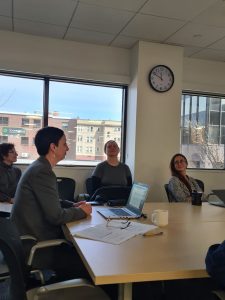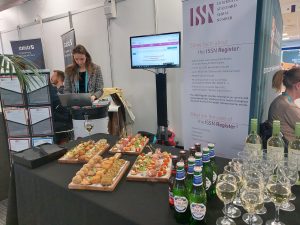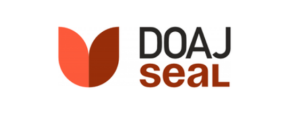|
ISSN Newsletter n° 139 - April 2025
|
|
 ISSN news |
|
|
ISSN IC Director invited by Harvard University Library (Cambridge, MA, USA, 2 April 2025)
|
Harvard University Library, Cambridge, USA, hosted a presentation by Gaëlle Béquet, the Director of the ISSN International Centre, Paris on April 2nd, 2025. Gaelle spoke about the history and impact of the ISSN, an industry standard identifier for print and digital serials and continuing resources, and recent achievements of the ISSN Centre on the occasion of its 50th anniversary. The vision of the Centre is to develop high quality, global information services for serials and continuing resources based on international standards and multilateral co-operation. The presentation was attended by 40 colleagues both in person and online.

|
|
|
|
|
UKSG – (Brighton, UK, 31 March – 2 April 2025)
|
The ISSN International Centre participated in the UKSG conference, providing us with the perfect opportunity to connect with our clients and partners over cocktails!

|
|
|
|
|
ISSN International Centre Clarifies Rules for ISSN Assignment
|
The ISSN International Centre, in collaboration with National Centres, ensures consistent and transparent assignment of ISSNs based on geographical rules. The country of publication is determined by the first or most prominent place listed, with external sources consulted if necessary. In disputed territories or unrecognized countries, the International Centre assigns ISSNs using the internationally recognized country code. Special measures are taken for split publications, including new ISSNs and detailed publication histories. While ISSNs provide global accessibility, they do not prove intellectual property rights, supporting bibliographic control and global dissemination of serial publications. Read the press release here.
|
|
|
|
|
Ukraine Suspends ISSN Issuance for Publishers in Occupied Territories to Protect Academic Integrity
|
Ukraine’s National ISSN Agency has stopped issuing ISSNs to publishers and printing houses operating in territories occupied by Russia, citing misuse of Ukrainian ISSNs by illegitimate publications. These outlets falsely claim legal succession of Ukrainian journals. The responsibility for ISSNs in these regions now falls to the ISSN International Centre, which is implementing safeguards. The move protects Ukrainian academic integrity and sets a precedent for conflict-affected regions. The initiative is supported by Ukrainian and international academic publishing organizations.
|
|
|
|
 Digital preservation |
|
|
Preserving the Maldives: The Importance of the Government Web Archive
|
Charlotte Giles, a South Asia reference specialist at the Library of Congress, discusses the Maldives Government Web Archive, which she started in 2021. The archive captures national government websites, including those for ministries and the President’s Office, primarily in Dhivehi and English. It aims to preserve the unique environmental and political challenges of an island nation. Giles highlights the difficulties in maintaining the collection, including tracking shifting government ministries, language barriers, and obtaining permissions. This archive is vital for documenting the Maldives’ government and its efforts in addressing climate change, with potential for future research.
|
|
|
|
|
The Digital Preservation Coalition and the American Institute of Physics join forces
|
The American Institute of Physics (AIP) has joined the Digital Preservation Coalition (DPC) as an Associate Member. Founded in 1931, the AIP represents the physics community in the U.S. and publishes numerous scientific journals. Its mission is to advance and promote the knowledge of physics for the benefit of humanity. By joining the DPC, AIP is reinforcing its commitment to digital preservation, ensuring long-term access to scientific data and fostering collaboration on preserving and sharing knowledge in the field of physics and beyond.
|
|
|
|
 Open Science |
|
|
Un pas vers la valorisation des logiciels libres de la recherche française
|
Le Comité pour la science ouverte lance la version bêta d’un catalogue dédié aux logiciels libres produits dans la recherche académique. Accessible en ligne, cet outil s’appuie sur les notices de HAL et s’enrichit automatiquement via des plateformes comme GitHub ou GitLab. Il vise à mieux référencer et valoriser ces logiciels, souvent méconnus mais essentiels à la recherche. Une enquête est également proposée pour recueillir les avis de la communauté scientifique afin d’améliorer le service. Ce projet s’inscrit dans le Plan national pour la science ouverte.
|
|
|
|
 Open Access |
|
|
Retirement of the DOAJ Seal is effective as from April 8th, 2025
|
DOAJ has implemented significant changes to its metadata, which were announced in January, including the retirement of the Seal as of April 8, 2025. These changes stemmed from a community consultation conducted in 2024, leading to the removal of certain links and two questions from the application form. To assist journal managers, editors, and publishers in addressing the absence of the Seal, DOAJ has prepared an information sheet for guidance. They encourage feedback and questions from the community via comments or email at blog@doaj.org.

|
|
|
|
|
New collaboration of DOAJ with EZB
|
The Directory of Open Access Journals (DOAJ) and the Electronic Journals Library (EZB) have collaborated to enhance the visibility and accessibility of open access publishing information. By exchanging open metadata, this partnership enables authors and researchers to access comprehensive journal details—including publication costs, submission guidelines, and review processes—through the EZB’s user-friendly interface. This collaboration streamlines the publishing process, promotes transparency, and supports informed decision-making for authors navigating the complexities of open access publishing.
 
|
|
|
|
 Libraries |
|
|
L’indexation RAMEAU assistée par l’IA
|
Le projet “Indexation RAMEAU assistée par IA”, testé entre octobre 2024 et janvier 2025 par 81 bibliothécaires, visait à évaluer un service d’indexation automatique des sujets RAMEAU assisté par IA. Les résultats ont montré que les suggestions de l’IA amélioraient significativement la qualité de l’indexation, faisant gagner du temps et aidant les catalogueurs, bien que les performances varient selon les disciplines. Les participants ont recommandé d’élargir les capacités de l’IA, notamment en ajoutant des concepts géographiques et chronologiques, et d’affiner le corpus pour inclure les thèses dans les domaines spécialisés. La majorité des testeurs soutiennent la pérennisation du service avec des améliorations continues et un meilleur accompagnement pour l’intégration de l’IA dans les pratiques de catalogage.
|
|
|
|
|
AskAboutSomethinK
|
Library collections are accessed through searches, but these don’t work well for mood or interest-based recommendations. The ASK project aims to use an AI bot for personalized suggestions, helping users find eBooks or music that match their preferences by using natural language queries. Available 24/7 in any language, this virtual assistant will provide tailored recommendations based on specific library collections.
|
|
|
|
 Publishing Industry |
|
|
COPE: Addressing Citation Manipulation in Scholarly Publishing
|
The Committee on Publication Ethics (COPE) defines citation manipulation as the inclusion of references that do not contribute to the scholarly content of an article but are added solely to increase citation counts. This unethical practice can involve excessive self-citation, excessive citation to the journal publishing the citing article, or coordinated citation between journals. COPE recommends that journals develop policies to determine appropriate self-citation thresholds, provide education for editors, and establish procedures to respond to potential citation manipulation. Penalties may include removal of editors from editorial roles or removal of journals from citation indexes.

|
|
|
|
 Scholarly Communication |
|
|
Evaluating Open Access journal coverage: insights from ROAD, ISSN, and major indexes
|
The article “Geographical and disciplinary coverage of open access journals: OpenAlex, Scopus, and WoS” compares how well three major databases—OpenAlex, Scopus, and Web of Science (WoS)—cover open access (OA) journals. It uses the Directory of Open Access scholarly Resources (ROAD), maintained by the ISSN International Centre, as a reference point for identifying legitimate OA journals. The study finds that OpenAlex includes a broader range of journals, especially those from the Global South and underrepresented disciplines, while Scopus and WoS show more selective and uneven coverage. This has implications for equitable scholarly visibility.
|
|
|
|
 Events |
|
|
70e congrès de l’ABF (Montreuil, France, 11 – 13 juin 2025)
|
Face à une surabondance d’information et à la circulation libre des données, la neutralité des bibliothécaires peut être mise à l’épreuve par l’actualité. Dans un monde de plus en plus complexe, il est crucial de réaffirmer la légitimité des bibliothèques en tant que lieux de confiance, aidant les individus à développer une autonomie éclairée. Le congrès proposera une réflexion sur l’esprit critique en bibliothèque, combinant introspection et ouverture au monde, afin de renforcer le rôle des bibliothèques dans l’accompagnement des publics vers une meilleure compréhension de l’information.
|
|
|
|
|
Open Science: Monitoring Press, Assessing Impact @ UNESCO Headquarters (Paris, France, 7-8 July, 2025)
|
The UNESCO Recommendation on Open Science encourages inclusive, transparent, and collaborative research, ensuring scientific knowledge is accessible globally. As adoption grows, monitoring its impact becomes crucial. The European Union-funded PathOS project, launched in September 2022, focuses on identifying and measuring the diverse impacts of open science. The conference “Open Science: Monitoring Progress, Assessing Impact,” organized in collaboration with UNESCO, PathOS, and others, marks the culmination of the PathOS project. It provides a platform to share findings, validate results, and foster collaboration to advance the principles of open science as outlined by UNESCO.
|
|
|
|
|